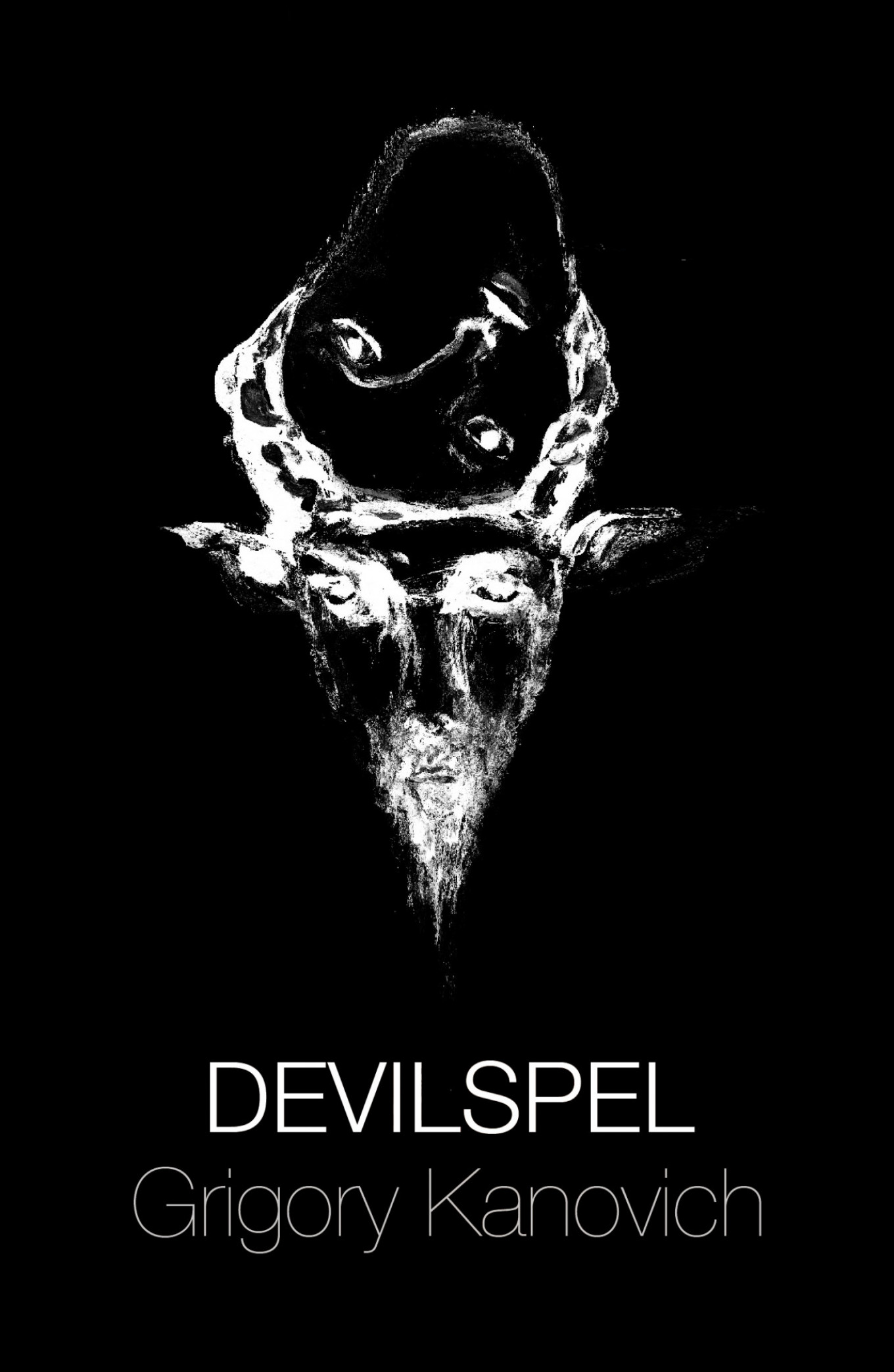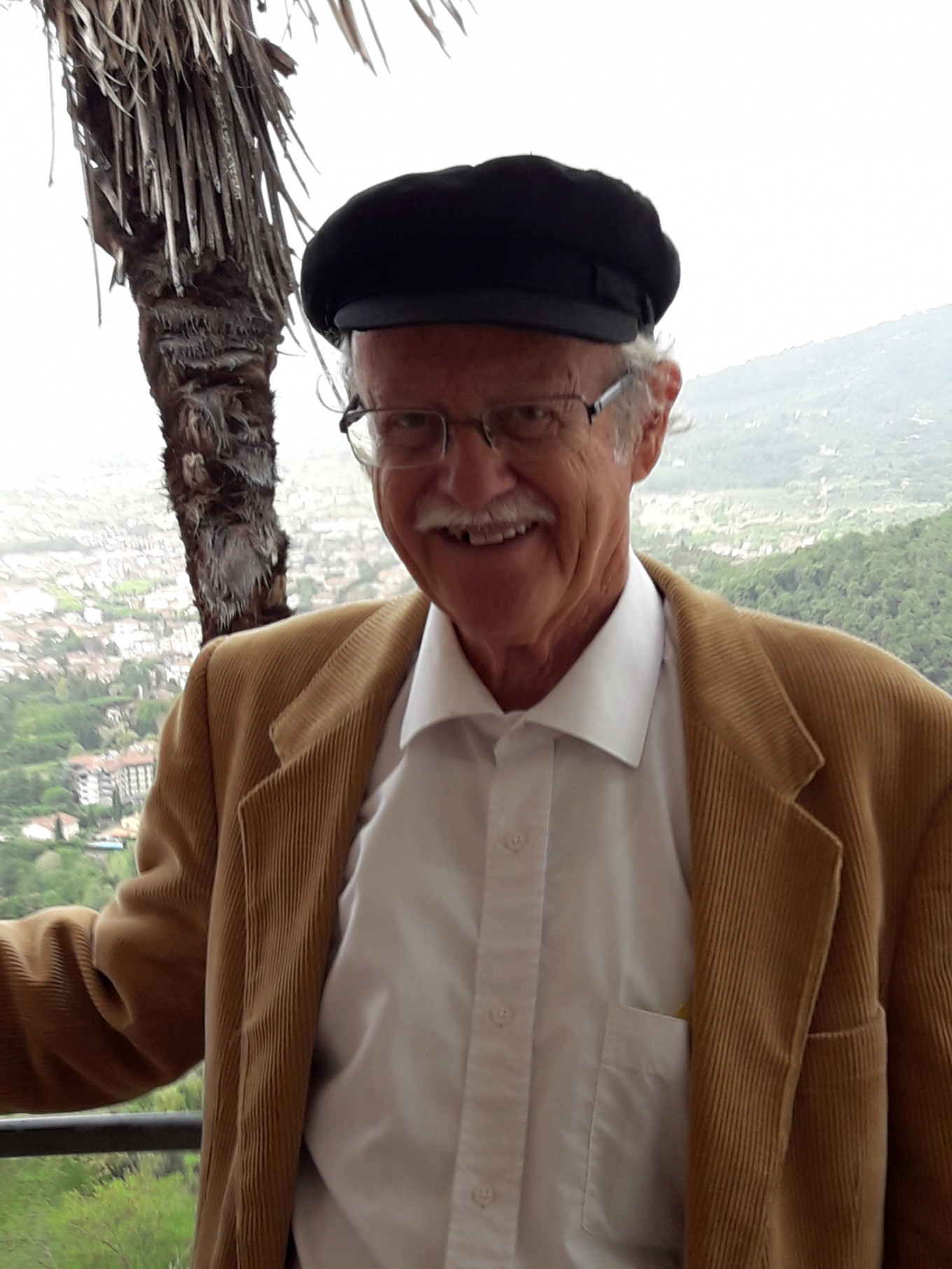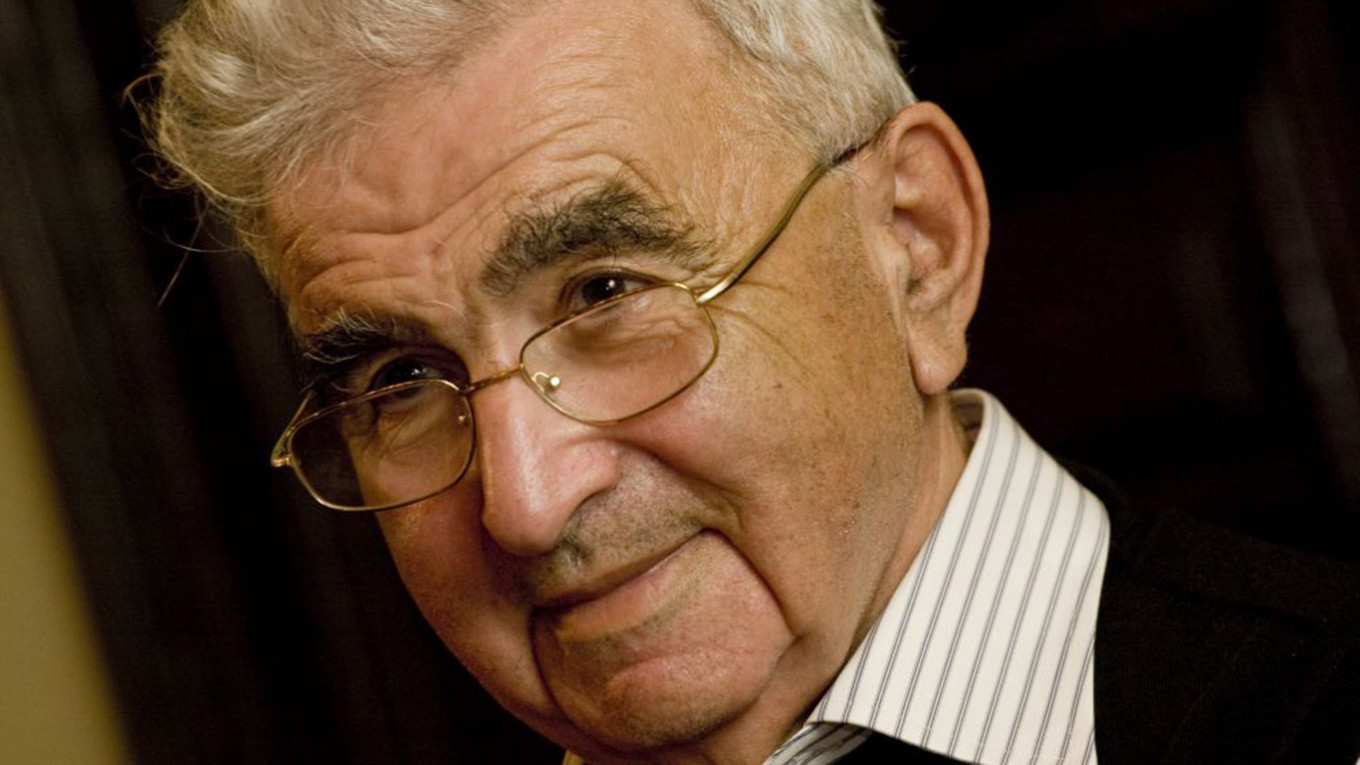
The European Bank of Reconstruction and Development (EBRD) held its third Book Prize for a work of literature originally written in the language of one of the forty countries in the bank's remit — Eastern and Central Europe, across Russia to Central Asia, the Southern Balkans, and the Eastern and Southern Mediterranean — and translated into English and published by a U.K. publisher.
The prize was awarded to Grigory Kanovich for his novel, “Devilspel,” which was translated by Yisrael Elliot Cohen and published by Noir Press.
Kanovich, 91, is now the sole surviving author with first-hand knowledge of life in the Lithuanian shtetl and the rich cultural heritage of Lithuania's Jews, the Litvaks. Kanovich was 12 when World War II broke out. He fled east with his parents from their native Jonova in Lithuania to a kolkhoz in Kazakhstan. After the war, Kanovich returned to his native Lithuania, where 95% of the Litvaks —more than 200,000 in all — had been exterminated by the Nazis.
Kanovich dedicated his life to preserving the rich cultural heritage of the Lithuanian shtetl in a body of work known collectively as the "The Litvak Saga," comprising ten novels that chronicle the fate of Eastern European Jews from the nineteenth century to the present. Kanovich's subject matter ensured that he was heavily censored during the Soviet era, distributed by smaller print runs in Soviet Lithuania, and often distributed by samizdat copies throughout the Soviet Union.
Wider recognition came after perestroika and Kanovich's emigration in 1993 to Israel. To date, his works have been translated into 14 languages, and he is gaining an ever-widening audience in his native Lithuania and beyond.
“Devilspel” takes the reader into the heart of Mishkine, a small community in the Lithuanian countryside where Jews and Gentiles have lived together — if not in perfect harmony then in pragmatic coexistence — for centuries. The Jews of Mishkine provide many of the essential, everyday services to the small town: here are butchers, millers, doctors, newsagents, and Reb Gedalye Bankvecher, the tailor, who may well be modeled on Kanovich's own father, Solomon. The Gentiles of Mishkine are farmers, like Cheslavas Lomsargis, on whose farm Bankvecher's idealistic daughter Elisheva works to learn the agrarian skills she needs to emigrate to Palestine. Inhabiting the grey area between Jew and Gentile is the eccentric Danuta Hadassa, a Polish woman from the minor nobility who turns up at Mishkine's Jewish graveyard with her illegitimate son, Yakov, and begs shelter from Yakov's grandfather Ephraim. Danuta Hadassa inherits the position of caretaker of the cemetery and rears Yakov and his younger brother, Aron, amidst the headstones.
The book opens during the troubled summer of 1941 when the complicated political situation raging outside the town begins to create new fissures between neighbors. After the 1939 Soviet occupation, Aron abandons his heritage and his wife, Bankvecher's elder daughter, for a promising government career in Moscow, while the taciturn Yakov remains at home, digging graves and courting Elisheva. But in 1941, with the Nazis moving steadily across Eastern Europe, former supporters of Lithuanian Independence see the Germans as the only force that can rid them of the Soviet occupiers, and the Jews of Mishkine seem a small price to pay.
“Devilspel” is a quiet novel: the actual violence happens offstage. But this allows Kanovich to explore the unimaginable horror and loss of this time in other ways, as he does so throughout the book with heartbreaking eloquence: Bankvecher's resigned but protracted farewell to his beloved Singer sewing machine, and the night terrors, which visit his former apprentice turned pro-Nazi cop, Juozas Tomkus.
The rapidly escalating antisemitism in Mishkine sits ill with Cheslavas Lomsargis, a Catholic whose true religion is the fertility of his land. Fond of Elisheva, he tries to shield her from the violence by creating a new identity for her for reasons that may not be entirely altruistic. But the farmer is also ambivalent about just how far he should stick his neck out to save Elisheva: "It's dangerous to stand out from a crowd," he tells her. "Either your own people will tear you apart, or the others will kill you. In theory, we're all heroes, but when it comes down to it, we're all the same shit…And what about you…did any one of your people come out when, two weeks before the war, our people were being dragged into cattle cars?"
Throughout “Devilspel,” characters reference items of clothing being carefully put away with naphthalene to protect them against the moths. In “Devilspel,” Kanovich does much the same to memory, preserving it for a time — not too far off now — when no one with first-hand knowledge of its significance will remain. The result is vivid, moving, and poignant novel that evokes a tiny hinge of history when politics fractures a community's social fabric to such an extent that nothing — not even naphthalene — can keep it from fraying.
Thomas de Waal, a member of the EBRD jury, said that he "was honored to be one of the four judges who gave the European Bank of Reconstruction and Development (EBRD) Literature Prize for 2020, now in its third year, to Kanovich and his translator, Yisrael Elliot Cohen for Devilspel. Properly, the EBRD celebrates equally both original and translation."
The book itself was something of a revelation to him. "To read a novel which is a quiet masterpiece, written by an author you have never heard of, feels like receiving a special gift. It is even more astonishing to learn that Grigory Kanovich, the Russian-speaking Lithunian-Jewish author of Devilspel is 90 years old. 'How have they hidden him from us all these years?' the English-language reader is entitled to ask."

Excerpt from "Devilspel"
Danuta Hadassa
Danuta Hadassa no longer remembered how many years had gone by since she found herself living out in the sticks; she had been on the road for years and had intended to put an end to her life in a roadside inn. Except for Ephraim Dudak, the father of her first husband Ezra and the grandfather of her first-born, she didn’t have a single acquaintance, not to mention a soulmate. It was the Lord Himself, apparently, who had convinced her not to return with her baistriuk – her little bastard – to seek refuge on the family estate in Smorgon, in Belorussia, with her aristocratic and gracious aunt, Stefania Skujbyszewska; instead she had headed for Lithuania, to sleepy Zhmud, where her seducer, the devil Ezra, had come from.
Of the Dudakov family tree, Danuta knew only that Ezra’s older brother, Shakhna, who later became her second husband, had once worked as a translator for the Wilno police department, translating the testimony of arrested Jews from Yiddish into Russian, and that the head of the family, Ephraim, was a stonecutter and gravedigger in the village of Mishkine, sheltered deep in the very woods where once, for three days and three nights in her wild youth (now long past), she had given in to the caresses of the cheerful and insatiable dissembler Ezra, who had, with his talents and temperament, conquered the heart of the provincial girl and carried her off to Wilno, the sinful pleasure-pits of which pulled people in like a whirlpool.
Danuta knew even less about Ezra’s tribe, the Jews. Aunt Stefania, a fervent Polish patriot and inveterate moralist, asserted that the Jews worshipped the golden calf, and, villains and miscreants that they were, had pitilessly crucified, “Our poor saviour, Jesus, Jesus Christ, and nailed Him to an oak cross with rusty, poisoned nails.” Ezra carelessly mocked such old wives’ tales, calling her aunt a “universal fool” and “a confirmed old maid,” swearing that there were no more merciful people on the earth than the Jews – that the Omnipotent One had commanded the Jews to love both their neighbours and foreigners, despite the fact that from time immemorial neither foreigners nor neighbours had shown particular love either for Him or for the people He had chosen.
“If Ezra’s father is alive,” Danuta thought, “I’ll fall at his feet. I’ll ask forgiveness for all my sins, both the real ones and those I’m not so sure about. I’ll ask him to forgive my sins and at least take Yuzik into his home; he’s completely innocent, even if he is a little wild from his long wanderings.” After all, the boy was a blood relative, his first grandson. She could hardly give the boy a start in life all by herself. And leaving him in an orphanage would definitely put an end to his chances.
Lord, when was that? Back under Nicholas II, the Tsar of all Russia – the Great, the Little, and the White – when in Poland, Lithuania and in Belorussia the only ruler was Russia and when, in her rosiest dream she, Danuta Skujbyszewska, could not have imagined that she would live such a long, such an extremely long life, and that in her lifetime two revolutions would take place and two wars would be fought – the first against Japan and then, less than ten years later, the one against the Germans. Or that three different regimes would seize power and that at the end of her mortal days her prophecy would come true and her younger son, Aron, a simple tailor, an apprentice to Gedalye Bankvecher, would become a big shot and leave Mishkine in a brand-new officer’s uniform with a military cap decorated with a red star and visor, bound not for just anywhere but for Moscow, where only one of her relatives, her father, Lieutenant Józef Skujbyszewski, had ever been, when he had served in the Leib-Guards right before the Bolshevik Revolution.
It was to Ephraim’s credit, in that distant, unhappy time when Danuta had turned up unexpectedly and without any warning at the large Jewish cemetery, that her father-in-law had not dismissed her as an itinerant whore. He did not mention how for whole days and nights she and Ezra had pounded the mattress which his deceased Leah had filled with new goose feathers every autumn. Nor did he ever complain about her sins or tell her to get lost, along with her son, who turned the tear-filled eyes of a frightened little animal on his grandfather.
Danuta would never forget how she stood in the cemetery yard, still and serene, and stammered to her first-born, who was all wrapped in rags, “My love, don’t stand there like a log. Smile. This is your grandpa, Ephraim.”
The boy listened, and his forehead wrinkled in confusion.
“Doesn’t he look like Ezra?” Danuta said to her frowning father-in-law after failing to draw a smile from her son. “The spitting image of him. And he’s a hooligan like Ezra too! He looks like you as well! I swear to God, he does. Just look at him. He and his father are as alike as two drops of water.”
“Yes, they are,” Ephraim said curtly and somewhat dubiously, after looking carefully at the boy.
Moved by the unexpected and generous agreement of her father-in-law, despite his severe appearance, Danuta began to cry.
“Don’t cry,” Ephraim comforted her. “We don’t weep for the living in a cemetery.” After a moment’s silence, he asked the newcomer, who was wiping her wet cheeks assiduously with a handkerchief, “What’s your name?”
“But didn’t Ezra introduce us back then?” she asked.
The old man twisted his forelock, grey now and thin, due to his age.
“My name is Danuta. The boy’s is Jozef, Yuzik in Russian. That was my father’s name. He was a lieutenant. Jozef Skujbyszewski, may he rest in peace.”
“Yuzik?” With lips as dry as an old piece of bread, Ephraim chewed over the unusual name. “A beautiful name. All the names in the world are beautiful. People’s names and the names of animals. But, if you will allow me, I will call the two of you in my own way; you will be Hadassa, after my mother, and my grandson will be Yakov, after my father.”
“That’s fine,” replied Danuta Hadassa, wiping warm, grateful tears across her face.
She would have agreed to anything as long as he didn’t chase them away, as long as he allowed them to stay there with the goat and the ravens and the dead. So, let it be Yakov and Hadassa, as long as there was a roof over their heads, a bowl of pea soup on the table and a tyufak – a straw mattress – in a curtained-off corner of the cottage. Only please let her stern father-in-law not change his mind . . . What if the Jews suddenly raised a scandal, asking what things had come to that a shikse was in charge of their cemetery? A Catholic at that! Shame on Ephraim, the bull taking a young heifer in his old age! He should get rid of her immediately! Let her go back where she had come from!
“Yakov,” Ephraim muttered, tapping the nose of the lad wrapped in rags. But his grandson did not move. He gazed at his grandfather suspiciously and began to snivel.
“He doesn’t recognize me at the moment,” Ephraim said. “That’s alright. He will, in time. Everyone will get used to you, the living and the dead, the stones and trees, the birds in the pine trees and the mice in the grass.”
Ephraim lit the stove, heated some water and poured it into a container that was usually used to wash dead bodies. He prepared to bathe his illegitimate grandson but, when the latter was naked, seeing that his organ was uncircumcised, impermissible for a male Jew, he called Zalman, the region’s renowned mohel. To the sound of the repetitive song and plaintive croaking of the ravens and the goats’ pitiful bleating, Zalman performed the ancient ritual on the little one, rendering him one of the Jewish people.
And soon it came about, as Ephraim had said, that everyone, the living and the dead, the mice and the ravens, the trees and the stones, became accustomed to the newcomers. But to his dying day the old man never called his daughter-in-law by her old name or her new one. Instead, when he needed her, he had his grandson call her. Danuta did not hold this against him. She didn’t call him by his name either, using only the formal ‘you’ right up until his death.
Danuta Hadassa also got used to Mishkine…
Excerpted from “Devilspel” by Grigory Kanovich, translated by Yisrael Elliot Cohen, and published by Noir Press Ltd.
Text copyright ©Grigory Kanovich. English translation copyright © Yisrael Elliot Cohen 2019
Used by permission. All rights reserved.
For more information about Grigory Kanovich and his book, see the publisher's site.
For more information about the EBRD award, see their site here. You can also read and listen to the author and translator in interviews by Vanora Bennett here.
A Message from The Moscow Times:
Dear readers,
We are facing unprecedented challenges. Russia's Prosecutor General's Office has designated The Moscow Times as an "undesirable" organization, criminalizing our work and putting our staff at risk of prosecution. This follows our earlier unjust labeling as a "foreign agent."
These actions are direct attempts to silence independent journalism in Russia. The authorities claim our work "discredits the decisions of the Russian leadership." We see things differently: we strive to provide accurate, unbiased reporting on Russia.
We, the journalists of The Moscow Times, refuse to be silenced. But to continue our work, we need your help.
Your support, no matter how small, makes a world of difference. If you can, please support us monthly starting from just $2. It's quick to set up, and every contribution makes a significant impact.
By supporting The Moscow Times, you're defending open, independent journalism in the face of repression. Thank you for standing with us.
Remind me later.







